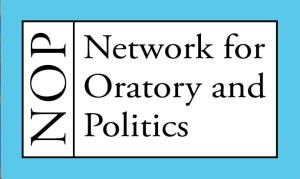
The UK general election campaign started on Tuesday 18 April 2017 when Theresa May announced that she would seek a general election on Thursday 8 June 2017. The day afterwards, the Westminster parliament approved this motion, so we are now in the midst of an election campaign.
The terms of the media debate have already been established: this will be an election about ‘leadership’, i.e. the deciding factor will be the personal qualities of the leaders of the main parties. This accords well with Aristotle’s theory of rhetoric. According to Aristotle, ethos (character) is the strongest and most effective proof of oratory (Aristotle, Rhetoric, Book 1.2, 1356a).
Commentators who argue that we should ignore the personalities of the party leaders, and focus on their actual policies instead, are ignoring the point that, for Aristotle, the most effective form of persuasion is not logos (the content of the argument), but ethos (character). In a time of political crisis (the Brexit process was formalized when Article 50 was triggered on 29 March 2017), rhetoric always comes to the fore. As the philosopher Hans Blumenberg puts it, rhetoric becomes essential whenever there is a need to act combined with a lack of knowledge. For Blumenberg, the lack of evidence and the compulsion to act are the preconditions of the rhetorical situation (see Blumenberg, Wirklichkeiten in denen wir leben, Stuttgart 1981, p. 117). Given that the UK government is now under compulsion to act, rhetoric and, particularly, ethos, are more important than ever.
Given that the political debate centres on questions of ethos and leadership, it is appropriate to reflect on the qualities which we look for in a political leader. Much of the current media coverage is debating who would be a stronger leader.
But is ‘strength’ really the most important quality for a leader? What about wisdom, courage, moral integrity, dignity, vision, or the ability to keep a cool head in a time of crisis? Or perhaps it is Machiavellian cunning which is required? It could be argued that the word ‘strength’, which has featured so much in recent media debates, has rather uncomfortable political associations. Arguably, it does not imply a democratic leader, but an autocratic one. Given the current rise in right-wing populism, and the current threat to liberal democracy in many European countries, it is disconcerting to hear journalists repeating the mantra that what is required is a ‘strong’ leader. If the debate is about leadership, then it should also be about what kind of leadership. At the same time, the debate needs to be widened so that it becomes a more informed and educated debate, not just on leadership and personal qualities, but also on the best leader to deal with the consequences of Brexit and other aspects of domestic and foreign policy. Ethos is indeed important, but does this mean that we should neglect debates about specific policies?

The reference to Blumenberg can be found (in English translation) at https://sael200f13.files.wordpress.com/2013/05/blumenberg-anthro-sig-of-rhetoric.pdf , p. 441.
LikeLike